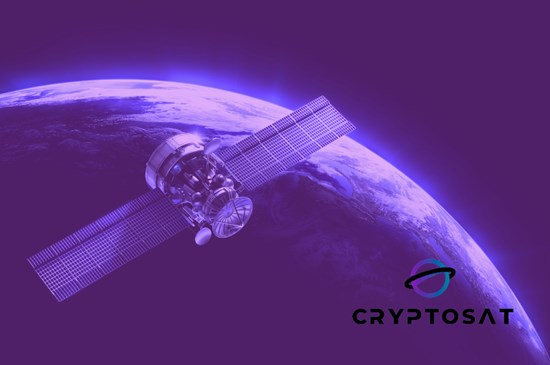
Mountain View, California–(Newsfile Corp. – April 4, 2023) – Cryptosat is poised to add its entropic share to the Ethereum KZG Ceremony from an earth-orbiting satellite. On Tuesday, April 4 at 06:00 GMT, Cryptosat’s entropy contribution will commence aboard the Crypto2 satellite, marking the first time such a feat has been attempted.
Figure 1
To view an enhanced version of this graphic, please visit:
http://images.newsfilecorp.com/files/8506/161216_683c50bbf4949823_001full.jpg
During the course of Cryptosat’s entropy commit, the public will be able to view the satellite’s progress in real-time. A dedicated dashboard tracking the satellite’s trajectory and the latest status of the entropy-generating process can be viewed here: http://kzg.cryptosat.io.
The satellite, which orbits the Earth every 90 minutes, follows a remote course that takes it over the North and South poles. It travels 550 km above ground, making it impossible for anyone to gain access during the course of the KZG contribution.
The KZG Ceremony is a coordinated public event designed to provide a cryptographic foundation for Ethereum scaling. More than 80,000 entities have already participated in the event, but Cryptosat’s involvement will mark the first time this has occurred from outer space.
KZG provides a decentralized alternative to the trusted setup required to launch certain blockchain protocols. To strengthen the security of the ceremony, the Ethereum Foundation requested the participation of special contributions to supply unique sources of randomness. Cryptosat’s tamper-proof execution environment, aboard orbiting satellite Crypto2, was designed for this express purpose.
Cryptosat’s Verifiable Random Beacon service will feed entropy generated aboard its Crypto2 satellite into the contribution generated for the ceremony. Each beacon is signed by the satellite itself and is verifiable using Crypto2’s public key which was generated in space following its launch.
Cryptosat Co-Founder Yan Michalevsky said: “Considering the prominence of Ethereum in the blockchain ecosystem, the significance of scaling the Ethereum blockchain cannot be understated. We’re absolutely thrilled that the Ethereum Foundation funded the execution of the KZG scheme using our satellite’s trusted setup ceremony.
“Seeing our technologies serve the world’s most expansive blockchain network is an important achievement for us, especially considering it’s been less than a year since the launch of our first satellite, Crypto1, into orbit.”
Cryptosat supports the creation of a full trusted setup for the purposes of bootstrapping various cryptographic protocols. Such a trusted setup can be executed on a single Cryptosat satellite or using multiple satellites if required.
In January, Crypto2 was launched into space aboard SpaceX Falcon 9. This model carries 30x more computational power than its predecessor Crypto1, which launched in May 2022.
Trusted setups are integral to cryptographic design, providing proof that there has been no tampering during the critical initialization process. They’re used to bootstrap popular SNARK schemes, whose security is dependent upon the point of conception. Space-based trusted setup eliminates the possibility of physical hack or network intrusion, making near earth orbit a new battleground in the quest for bulletproof cryptography.
Using its own satellites built from the ground up, Cryptosat can guarantee that no third party has interfered with the compute environment prior to its being launched into orbit. This provides a unique guarantee that not even nation-state actors can tamper with the operations that are carried aboard the satellite.
About Cryptosat
Cryptosat builds and launches satellites that power blockchain and cryptographic protocols. Satellites are physically inaccessible and can serve as the most secure root-of-trust that guarantees the confidentiality and integrity of sensitive computations and data. Such tamper-proof satellites can serve numerous use-cases including transaction signing, trusted setups for cryptographic schemes, a randomness oracle, time-oracle (VDF) and more.
Founded by Stanford PhD alumni and second time founders Yonatan Winetraub and Yan Michalevsky, Cryptosat’s team have a background in aerospace engineering, applied security, and cryptography. In 2018, they published the SpaceTEE paper that first introduced the idea of using small satellites for protecting sensitive cryptographic operations and protocols. In May 2022, their first satellite, Crypto1, was launched into orbit. In March 2022, the team completed an experiment onboard the International Space Station.
To learn more, visit Cryptosat’s website (http://cryptosat.io/), and subscribe to the Cryptosat Medium.
Media Contact:
Kim Bazak, MarketAcross
Kim@marketacross.com
To view the source version of this press release, please visit http://www.newsfilecorp.com/release/161216